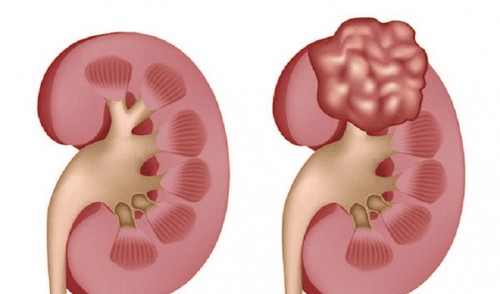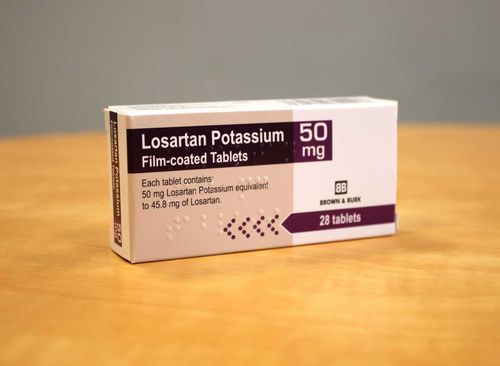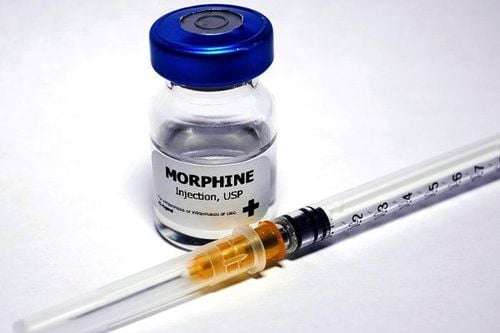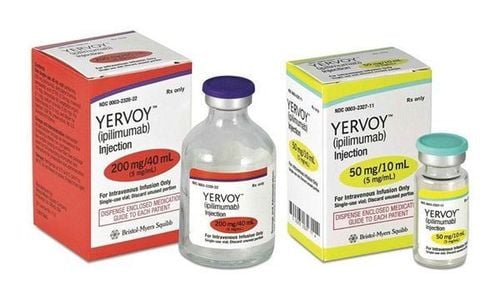This is an automatically translated article.
Adrenal cancer is a condition that occurs when abnormal cells form or migrate to the adrenal gland, usually occurring in the gland's outermost layer, also known as the adrenal cortex. What do doctors do to detect and treat adrenal cancer?1. Can adrenal cancer be detected early?
The human body has two adrenal glands, one on each kidney. This is a rare type of cancer and is common in children under the age of 5 and adults between the ages of 40 and 50. Currently, it is difficult to detect adrenal cancer early and is usually only detected when the tumor is already quite large. Adrenal cancer in children is often detected earlier than in adults because children are more likely to secrete hormones that lead to signs and symptoms to make them easier to detect. For example, a child may develop signs of puberty before the sex hormones are produced early by adrenal cancer cells.
These tumors are sometimes accidentally detected early in adults, such as CT scans of the abdomen when the patient has other health problems.
2. Diagnostic methods for adrenal cancer
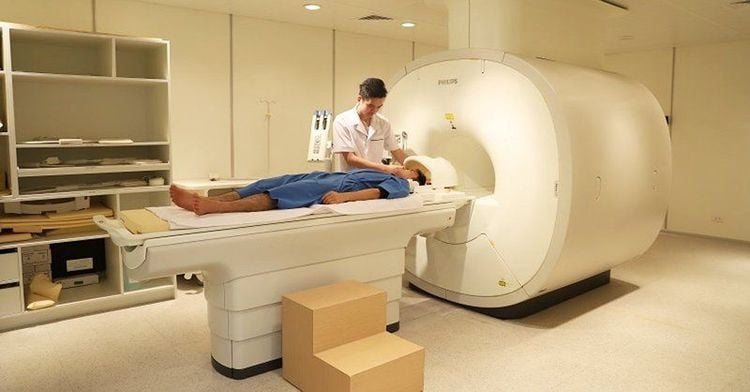
Chụp cắt lớp vi tính (CT) có thể cho hình ảnh tuyến thượng thận khá rõ ràng và thường có thể xác nhận vị trí của ung thư
Physical exam and medical history
If you have signs or symptoms suggestive of adrenal cancer, the first step is usually for your doctor to ask about your complete medical history to learn more about the possible cause. can lead to disease. Your doctor will want to know if anyone in your family has had adrenal cancer or any other type of cancer. Your doctor may also ask about the activity of your menstrual or sexual cycles and about any other symptoms you're experiencing. Your doctor will thoroughly examine your abdomen for signs of a tumor. Imaging
Chest X-ray: Can show if cancer has spread to the lungs and to identify severe lung or heart disease. Ultrasound: Using sound waves to create images of parts of the body, doctors perform this technique to look for tumors in the adrenal glands and to check for tumors in the liver if the cancer has spread. In general, ultrasound is not used to look for an adrenal tumor unless a CT scan is not performed. Computed tomography (CT) scan: Gives a fairly clear picture of the adrenal glands and can often confirm the location of the cancer. In addition, a CT scan can also help detect whether cancer has spread to the liver, lymph nodes, or other organs. Magnetic resonance imaging (MRI): Shows detailed images of soft tissues in the body. But an MRI uses radio waves and a strong magnetic field instead of X-rays, so an MRI is more informative than a CT scan because it can distinguish adrenal cancer from a benign tumor. An MRI scan is especially helpful in examining the brain and spinal cord. In people who suspect an adrenal tumor, during an MRI of the brain, the doctor will examine the pituitary gland. When a patient has a tumor in the pituitary gland, the symptoms and signs will be similar to an adrenal tumor, so the doctor will distinguish between a pituitary tumor and an adrenal tumor. Other tests: Laparoscopy: A thin, flexible endoscope with a small video camera on the end, is inserted through a small opening in the patient's abdomen so the doctor can see the location of the cancer. growing cancer or to help detect distant spread and enlarged lymph nodes. Abdominal exploration may be done to help predict whether the cancer can be completely removed with surgery. In addition, during the endoscopic observation of an adrenal tumor, the doctor can sometimes also remove a small benign adrenal tumor through this instrument. Biopsy: Imaging techniques can find a tumor, but the only way to know for sure if it is cancerous is with a test Hormone tests in the blood and urine: Tests Blood and urine tests to measure adrenal hormone levels are important in deciding whether a patient with signs and symptoms of adrenal cancer has the disease. For urinalysis, the patient is asked to collect all of their urine within 24 hours. Blood and urine tests are just as important as imaging tests in diagnosing adrenal cancer. Doctors can choose which tests to order based on a patient's symptoms. But often doctors will check hormone levels even when there are no symptoms of high hormone levels. This is because symptoms caused by abnormal hormone levels can be very difficult to detect, and blood tests can detect these changes even before symptoms occur. Cortisol test: Cortisol levels are measured in the blood and in the urine. If an adrenal tumor is making cortisol, it will be abnormally high. Before this test, the patient is given dexamethasone, which is a drug that acts like cortisol. If the person does not have an adrenal tumor, dexamethasone will lower levels of cortisol and similar hormones. But if you have an adrenocortical tumor, levels of the hormone cortisol will remain elevated after receiving dexamethasone. Levels of another hormone called ACTH are also measured to help distinguish adrenal tumors from other diseases that can cause high cortisol levels. Testing for aldosterone, androgen, or estrogen: In a patient with high levels of aldosterone, androgen, or estrogen, a tumor may be present.
3. Adrenal Cancer Treatment

Mục tiêu của phẫu thuật là loại bỏ toàn bộ khối ung thư tuyến thượng thận
Treatment for adrenal cancer usually includes surgery to remove all of the cancer and some other treatments that can be used to prevent the cancer from coming back or not being able to do. surgery.
Surgery The goal of surgery is to remove the entire adrenal cancer mass. To achieve this, the doctor must remove all parts of the affected adrenal gland.
If surgeons find cancer has spread to nearby organs, such as the liver or kidneys, part or all of these organs may also be removed during surgery.
Radiation Therapy Radiation therapy uses high-energy beams, such as X-rays and protons, to kill cancer cells. Radiation therapy is sometimes used after surgery for adrenal cancer to kill any remaining cancer cells. In addition, the effects of radiation therapy can also help patients reduce pain and reduce symptoms of cancer when it has spread to other parts of the body, such as bones.
Chemotherapy Chemotherapy uses drugs that use chemicals to kill cancer cells. For people with adrenal cancer that can't be treated with surgery or have been treated for metastatic adrenal cancer, chemotherapy may be an option to slow the cancer's progression.
Currently, at Vinmec International General Hospital, cancer screening packages are applied to detect the disease at an early stage, shorten the treatment time, reduce the economic burden and maximize the possibility of recovery for customers. row.
Please dial HOTLINE for more information or register for an appointment HERE. Download MyVinmec app to make appointments faster and to manage your bookings easily.
References: Mayoclinic.org, Cancer.org, Webmd.com



